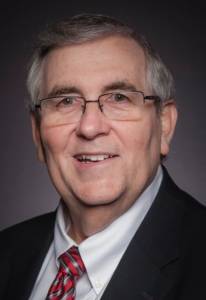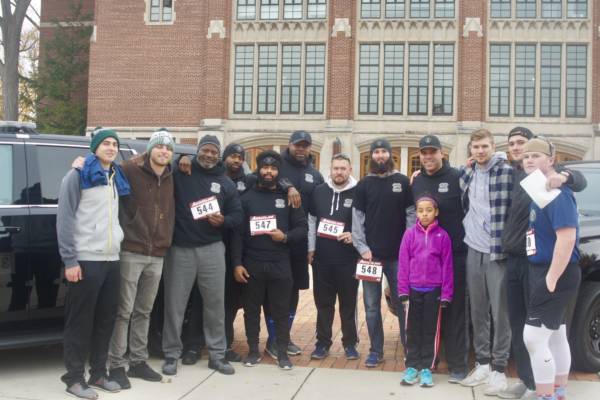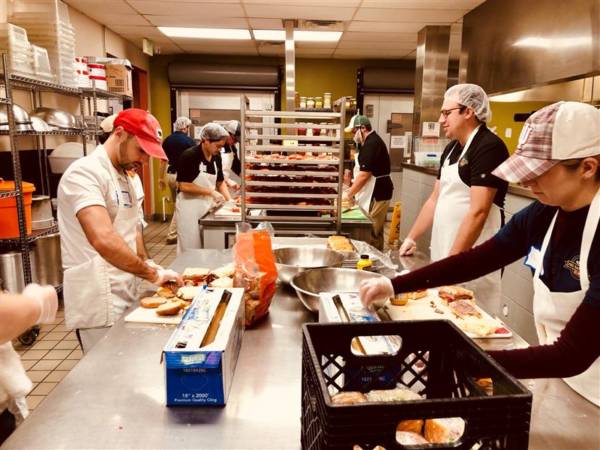Addressing Poverty
To make a true difference in breaking the cycle, seek to first understand the complex issue
By Rick Miller, Phi Psi Family Volunteer 
It is easier to live your beliefs as a Phi Kappa Psi brother and achieve the new focus of Addressing Poverty by providing service to those who are less fortunate if you understand what Poverty is and is not.
To get the big picture and to better understand the complexities associated with poverty, we must first understand that there are three ways that the Fraternity approaches addressing poverty, which include Community Service, Fundraising, and Advocacy.
The first thing we need to do is understand poverty: What it means, who is impacted, where best to serve, and how to make a lasting difference. Simply put, poverty is not being able to meet the daily needs to feed, clothe, house, or take care of health issues because the needs exceed the financial resources coming into a household. But, this definition falls short. The truth is that poverty is not simply a resource issue. Poverty is a complex combination of systemic, social, mental, physical, and information factors. There are approximately 50 million Americans that fall into the category of living in poverty, including 1 out of every 4 children.
Dr. Ruby Payne, a well-known resource and educator working with other educators, students, and nonprofit organizations helps us see poverty from other points of view. Her research shows us that there are two basic types of poverty we encounter:
Generational Poverty – being in poverty for at least two generations. The characteristics show up faster when an individual lives with others who are from a generational poverty background.
Situational Poverty – can be defined as a lack of resources due to job loss, an accident, chronic illness, death, divorce, and unexpected extraneous circumstances.
I interviewed Dr. Jerry Goebel, an activist who has worked to help individuals break the cycle of poverty, and I asked what he could share on the subject. His reply: “I would say it is important to view poverty as not just a resource problem. It’s also a relational problem. We work to help kids network their way out of poverty. It’s not just a lack of financial capital, but also social capital. I believe the role of leadership today is to build ‘crossable bridges’ between those who have and those who do not. Our churches and government have been trying to address poverty as solely a resource issue for centuries and it has made little impact.”
When you volunteer to work at the Boys & Girls Club, Habitat for Humanity, Big Brothers/Big Sisters, the YMCA, local after school or reading programs and the myriad of other programs Phi Psi supports, you have an excellent opportunity to be a role model, build relationships, and add social capital while serving and building bridges. It is not only important that you do these things, but also how and why you do them.
In addition to looking at the two basic types of poverty, there are also other areas in our lives where we could be impoverished: “The Memo,” written by John Hope Bryant speaks to the notion that in life, many of us didn’t get “The Memo.” Also known as that critical piece of information that told us what and how to be successful, learn and earn, act and succeed. The factors that Bryant says impact our understanding no matter our station in life are:
Embrace that we live in a country where the Free Enterprise system works
Develop your Inner Capital
Create Relationship Capital or Social Capital
Understand the Mindset of making or losing money (and other resources)
Seek the source of your Spiritual Capital
Just like not getting “The Memo,” many of us start out with good intentions to serve others without realizing that we come to serve unprepared, ignorant of the ramifications and consequences of our own behavior, and then leave the experience wondering if it was worth it. This has been my experience. To quote my father, “Ignorance is a condition, stupidity is a choice. Ignorance can be fixed!” I confess that I have participated in team service projects to aid the less fortunate, raised funds and presented one of those six-foot-long checks in a photo opportunity. I’ve also invested time to help “rescue” persons from their situation. I was ignorant! I was doing it because it was expected, the organization needed some “goodwill points” in our image bank account, and it made me feel good to be part of something that “helped.” It made me one of the good guys. Right?
I didn’t know then what I know now. I wasn’t building REALationships, I was just another guy going across town to work on a project, never to be seen again. Having fun with my fellow do-gooders, not even talking to or getting to know the people being served. Our team had the wrong “why” as the motivating factor behind the service. Yes, the house got painted, the park got cleaned, the games were taught, and equipment donated, but we missed the point. We did not connect. We did not share critical information and we did not listen to their real needs. We talked in a language they neither knew nor understood. We were one shot wonders.
You see, author, speaker, publisher and career educator Dr. Ruby Payne opened my eyes to hidden rules that exist between classes of people in her book “A Framework for Understanding Poverty.” The folks in poverty, the middle class, and the wealthy all see and experience the world from differing points of view. Here’s my favorite example:
Three students go to a sports banquet at school. The student from the home in poverty is asked by their guardian (they might not be living with family), “Did you get enough to eat?” The middle-class student is asked, “Was the food good?” (the focus being on quality, not quantity). The wealthy student is asked, “Who was there, how was the presentation and the service?”
This example gives clues to some of the hidden rules and language of classes.
For poverty: Were your hunger needs met?
For middle class: Did the quality of the food meet your expectations or standards?
For wealthy class: What social connections were there, and was the presentation and service of the food up to your standards?
These hidden rules extend to areas like possessions, money, clothing, personality, social emphasis, time, education, destiny, language, family structure, world view, love, and one’s driving force. Each of these has a definite set of rules and clues of how to see the situation, then understand how best to serve. I highly recommend reading more from Dr. Payne’s research and practical application, no matter what your major or profession.
In my personal experiences from the past, we were practicing what is known as “toxic charity” where we were doing more harm than good. When we do things without purpose or intent, we are essentially creating a bigger problem by enabling, and literally robbing people of their dignity. It was ignorant, non-intentional and misguided. A major critic of toxic charity is Robert D. Lupton who moved into the neighborhood where he was serving to best understand and make real and lasting changes. In the process, he created the Oath for Compassionate Service, which has been adopted and modified by many organizations:
Never do for the poor what they have (or could have) the capacity to do for themselves
Limit one-way giving to emergency situations. (situational poverty)
Strive to empower the poor through employment, lending, and investing, using grants sparingly to reinforce achievements
Subordinate self-interest to the needs of those being served
Listen closely those you seek to help, especially to what is NOT being said – unspoken feelings may contain essential clues to effective service
Above all, do no harm
What you can do:
-
Advocate for real change to be made in the infrastructure.
-
Seek policy changes.
-
Provide a positive role model.
-
Listen to the people you seek to help for the real needs they have, and never superimpose your notion of what is best on the reality of the situation.
-
Most importantly, continue to do the right thing in the right way for the right reason.
What Service Means to You
Members across the nation join the fight to end poverty in their own communities
The act of participating in philanthropy work is the process of identifying and addressing the root cause of the problems affecting a community. While philanthropy is sometimes referred to as an event that helps raise money for a charity, the foundational concept of philanthropy is about much more than that. Our philosophy is that the greatest philanthropic impact occurs when members engage in three distinct forms of philanthropy simultaneously: Community Service, Fundraising, and Advocacy.
As a member of Phi Kappa Psi, you are taught to embrace service and make it part of your daily life. Little by little, the Fraternity can make positive impacts in the world, starting in local communities.

In early November, MI Beta hosted the “Phi Kappa Psi Jog For Justice,” a 5k run around campus where all money was donated to the Flint Police Department. Over 100 people ran the race, including multiple people from the Flint Police Department. The brothers raised over $6,000 for philanthropy during the Fall term.

In early December, Phi Kappa Psi Headquarters staff partnered with Indianapolis-based nonprofit Second Helpings to aid in the preparation over 4,000 meals to feed recipients from 90 central Indiana social service agencies. The Second Helpings community kitchen focuses not only on food rescue and distribution, but also in offering culinary job training for disadvantaged adults. Headquarters staff members.
